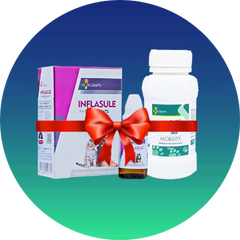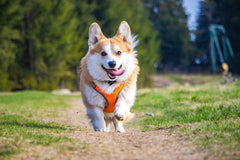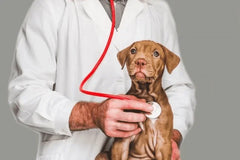
Understanding Parvovirus in Dogs: A Complete Guide for 2025
Canine parvovirus is one of the deadliest and most highly contagious viral infections affecting dogs worldwide. It is so named because it is most common in puppies and unvaccinated dogs. The parvovirus attacks both the gastrointestinal system and the immune system, and can kill an infected dog very quickly. The spread of this disease in 2025 means that all dog owners should remain aware of and understand this disease. This guide provides a detailed overview of information on Parvovirus in dogs, including symptoms, treatment, and how the use of advanced products, such as Parvo-go by Goel Vet Pharma, helps tackle this disease effectively.
What is Parvovirus in Dogs?
Dangerous and fast spreading Canine parvovirus (CPV) is highly contagious and attacks the rapidly dividing cells in a dog’s body, which includes those in the digestive and immune system. The virus damages the lining of the intestines (mucosa), resulting in signs and symptoms that range from vomiting and diarrhea (sometimes accompanied by blood) to dehydration and an impaired immune system. Puppies from 6 weeks to 6 months old are most at risk, but unvaccinated adult dogs are also susceptible to this disease.
Recognizing Parvovirus Symptoms in Cats
Early detection is key to improved survival. Dogs usually show parvovirus symptoms in cats 3 to 7 days after being infected, including:
- Severe lethargy and depression
- Sudden loss of appetite
- Persistent vomiting
- Sudden, often bloody and smelly diarrhea
- Abdominal pain and bloating
- Fever, or in severe cases, hypothermia
- Dehydration and weakness
While parvovirus infection is specific to dogs, the parvovirus symptoms in cats (which are also caused by a feline-specific parvovirus) include vomiting, diarrhea, and lethargy. However, feline parvovirus is a separate disease and is typically referred to by veterinarians as feline panleukopenia.
How is Parvovirus Diagnosed?
Veterinarians may use clinical signs, a history of exposure, and diagnostic testing, including ELISA antigen tests or PCR testing of fecal samples, to diagnose parvovirus. An early diagnosis is crucial for prompt therapeutic intervention.
Treatment of Parvovirus in Dogs
Presently, there is no established antiviral treatment for parvovirus in dogs. Treatment involves containment and supportive care, allowing the dog’s body to fight off the infection and its associated symptoms. The following are the primary aspects of canine parvovirus treatment in dogs:
- IV fluid therapy: To treat extreme dehydration due to vomiting and diarrhea.
- Anti-nausea medications: Maropitant or ondansetron to manage vomiting and nausea.
- Antibiotics: If secondary bacterial infections of the damaged intestinal lining occur, they can be prevented or treated with broad-spectrum antibiotics like ampicillin or cefazolin.
- Diet: A restricted diet or a feeding tube to avoid malnutrition during the recovery phase.
- Isolation: To avoid spreading the virus to more dogs.
Monoclonal antibody therapies are also currently available in advanced veterinary centers to help neutralize the virus, reducing severity and time spent in the hospital.
What is Parvo-go and How Does it help?

Parvo-go is a formulation by Goel Vet Pharma Pvt. To minimize side effects, please follow the provided directions and use the drops under the supervision of a healthcare professional. Homeopathic treatment for Parvovirus in dogs and Parvovirus in cats. It has been specially formulated to support the immune system and help reduce symptoms associated with parvovirus.
Key Features of Parvo-go:
- Homeopathic Formula: The natural ingredients in this homeopathic product are designed to provide you with a higher level of health without the fear of harmful side effects.
- Dual use: for dogs and cats with parvovirus infection.
- Easy to administer: Dosed as drops; easy for pet owners to give.
- Aids in recovery: Helps with vomiting, diarrhea, and lethargy while boosting the immune system.
- WHO GMP Certified: Made SOFTGEL under WHO GMP Accreditation Standards ensures the quality and safety.
Parvo-go is not a treatment in itself, but a powerful complement to traditional parvo treatment in dogs, accelerating the recovery process when used in conjunction with professional care.
How to Use Parvo-go for Parvovirus in Dogs and Cats
Parvo-go is given orally as drops onto the tongue and can be mixed with food or as directed by your veterinary professional. Daily use throughout the illness is recommended to aid in symptom relief and healing. Of course, whenever possible, stick to the dosages specified on the package of your product or as directed by your veterinarian.
Why Early Treatment is Critical
Parvovirus is highly contagious and can be fatal within days if left untreated. With early veterinary intervention and supportive care, as well as the use of products like Parvo-go, survival rates are significantly increased. Hospitilised patients who are treated aggressively are left with survival rates of over 90% and those with the correct medicine and supplements, and on an outpatient basis, can be cured by 80%.
Additional Tips for Managing Parvovirus
- Isolation: Infected dogs should be separated from other pets to prevent the transmission of the virus.
- Hygiene: Disinfect heavily contaminated areas and wash hands after contact with infected animals.
- Vaccines: The most effective method of protecting your dog against Parvovirus is by getting them vaccinated.
- Monitor closely: Keep an eye out for worsening symptoms, such as persistent vomiting, severe diarrhea, or signs of shock, and seek emergency care if these develop.
Parvovirus in Cats: What You Should Know
Although this guide primarily focuses on dogs, it is worth noting that cats can also develop a related parvovirus infection, known as feline panleukopenia. They are sick, showing signs such as vomiting, diarrhea, and lethargy, like a dog. Parvo-goo is also designed to help cats with parvovirus, providing supportive care in conjunction with your veterinarian's treatment.
Conclusion
The parvovirus in dogs remains a deadly issue, but knowing what to look for, available treatment options, and preventive strategies can quite literally save your dog's life. Although there's no current parvo cure in dogs, symptomatic care, aided by groundbreaking products such as Parvo-go from Goel Vet Pharma, can help dogs and cats with infections fare much better than they otherwise would. The keys to successful treatment of parvo include early intervention, hydration, and immune system support.
Goel Vet Pharma Pvt Ltd is the trusted source of homeopathic veterinary medicines made from the purest quality materials, with the best of services, for the benefit of man’s best friend. Their best product, Parvo-go for Parvo Virus in Dog and Cat, is produced under strict WHO GMP guidelines and is supported by clinical trials. Intended to support traditional veterinary care, Parvo-go enables pet owners to actively support their infected four-legged friends in the best way possible through parvo treatment in dogs.
For pet parents seeking veterinarian-approved solutions, Goel Vet Pharma offers the most innovative products, ensuring customer satisfaction is never an issue.
Keeping up to date on the facts and acting proactively can mean the difference in your pet's life if they contract parvovirus. Parvo-go is one of the most effective natural products for maintaining your pet’s health, naturally!








